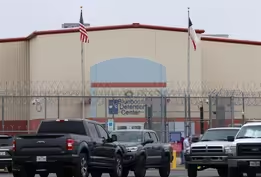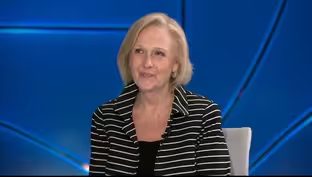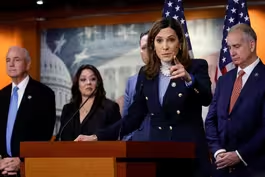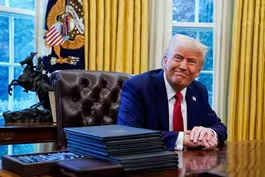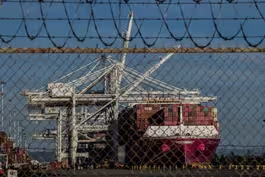
How Mark Carney led Canada's Liberal Party to election win
Clip: 4/29/2025 | 10m 4sVideo has Closed Captions
How Mark Carney led Canada's Liberal Party to an election win
Canada's Liberal Party secured a fourth consecutive term after a narrow win in an election that was seen as one of the most consequential in its recent history. Prime Minister Mark Carney flipped his party's fortunes with a campaign focused on combating President Trump’s tariffs and threats of annexation. Nick Schifrin discussed the result with Shachi Kurl of the Angus Reid Institute.
Problems playing video? | Closed Captioning Feedback
Problems playing video? | Closed Captioning Feedback
Major corporate funding for the PBS News Hour is provided by BDO, BNSF, Consumer Cellular, American Cruise Lines, and Raymond James. Funding for the PBS NewsHour Weekend is provided by...

How Mark Carney led Canada's Liberal Party to election win
Clip: 4/29/2025 | 10m 4sVideo has Closed Captions
Canada's Liberal Party secured a fourth consecutive term after a narrow win in an election that was seen as one of the most consequential in its recent history. Prime Minister Mark Carney flipped his party's fortunes with a campaign focused on combating President Trump’s tariffs and threats of annexation. Nick Schifrin discussed the result with Shachi Kurl of the Angus Reid Institute.
Problems playing video? | Closed Captioning Feedback
How to Watch PBS News Hour
PBS News Hour is available to stream on pbs.org and the free PBS App, available on iPhone, Apple TV, Android TV, Android smartphones, Amazon Fire TV, Amazon Fire Tablet, Roku, Samsung Smart TV, and Vizio.
Providing Support for PBS.org
Learn Moreabout PBS online sponsorshipGEOFF BENNETT: Canada's Liberal Party secured a fourth consecutive term after a narrow win in an election that was seen as one of the most consequential in its recent history.
AMNA NAWAZ: Liberal Party candidate and interim Prime Minister Mark Carney flipped his party's fortunes with a campaign focused on combating President Trump's tariffs and threats of annexation.
Nick Schifrin has the story.
NICK SCHIFRIN: In Ottawa today, Canadian Prime Minister Mark Carney returned to his office victorious after celebrating a victory that he scripted with an unlikely co-writer.
MARK CARNEY, Canadian Prime Minister: President Trump is trying to break us so that America can own us.
That will never -- that will never, ever happen.
We will fight Trump's countertariffs.
NICK SCHIFRIN: Carney's combative tone throughout the campaign against President Trump's taunts... DONALD TRUMP, President of the United States: So I think Canada is going to be a very serious contender to be our 51st day.
NICK SCHIFRIN: ... led Carney and the Liberal Party to a remarkable reversal of fortune.
In January, when former Prime Minister Justin Trudeau stepped down... JUSTIN TRUDEAU, Former Canadian Prime Minister: I intend to resign as party leader, as prime minister.
NICK SCHIFRIN: ... Trudeau and the Liberal Party appeared set to lose by double digits.
But Trump maintained his pressure, disparaging Trudeau, vowing imperial expansion and portraying Canada not as a neighbor, but an economic drag.
DONALD TRUMP: They should be a state.
I mean that.
I really mean that, because we can't be expected to carry a country.
NICK SCHIFRIN: Anti-Trump sentiment in Canada surged and became a newfound nationalism.
That helped Carney, who's led both the Canadian and the British central banks, portray himself as the best candidate to take on Trump.
HEATHER MCALLISTER, Ottawa Resident: It is a scary time with what's happening across the border in the United States, and I feel that Mark Carney is the serious choice for a leader who will address that really with the right level of gravitas.
NICK SCHIFRIN: In contrast, Conservative leader Pierre Poilievre's policies and rhetoric were characterized as Trump-like.
He lost even his own election.
SYLVIE BOUDREAU, Haskell Free Library: When the people are coming here, they are putting one foot in Canada and one foot in the United States.
NICK SCHIFRIN: These Trump-propelled politics perhaps personified in the Haskell Free Library, where for 120 years Americans and Canadians have been able to read across a border marked only by a line of tape.
SYLVIE BOUDREAU: The library always been a symbol of unity, a symbol of unification, a symbol of friendship, a symbol of our two countries, our two communities.
NICK SCHIFRIN: Sylvie Boudreau is the president of the library's board of trustees.
The Trump administration will soon block Canadians from entering the U.S. side without going through border control.
And in this election, Boudreau says Canadians rallied against U.S. pressure.
SYLVIE BOUDREAU: The election was about who's going to be the best person to deal with Donald Trump.
It should not have been that.
It should have been just about our -- us Canadians.
This is what it is.
NICK SCHIFRIN: The Liberals failed to secure a majority and will likely have to form a coalition government.
So, Carney faces a challenging road ahead, one that he says will be paved without American partnership.
MARK CARNEY: Our old relationship with the United States, a relationship based on steadily increasing integration, is over.
The system of open global trade anchored by the United States is over.
These are tragedies, but it's also our new reality.
We are over -- we are over the shock of the American betrayal, but we should never forget the lessons.
NICK SCHIFRIN: Tonight, President Trump and Prime Minister Carney spoke on the phone, and Carney's office said the leaders agreed on Canada and the U.S. working together -- quote -- "as independent sovereign nations."
To decode what all this means for Canada and U.S.-Canada relations, we turned to Shachi Kurl, president of the Angus Reid Institute, an independent research not-for-profit.
She joins me from Vancouver.
Shachi Kurl, thanks very much.
Welcome to the "News Hour."
As we noted, Mark Carney took over as prime minister just two months ago at a moment when the Liberal Party was way down in the polls.
How do you think he turned -- he was able to execute this reversal of fortune?
SHACHI KURL, President, Angus Reid Institute: Well, thanks very much for having me this evening.
There were really three factors.
Some of them, you have already covered in the report that you put together.
One of those things was, of course, the Trump factor.
Trump was in many ways the main character in the narrative of the Canadian election, overshadowing both Carney and his main conservative opponent, Pierre Poilievre.
So if Canadians were planning to look at their ballot question and really what was driving their vote through the lens of do the governing Liberals deserve a rare fourth term after almost 10 years in power, that was pushed entirely to the side by questions of sovereignty.
And it's important to remember, I think, for a U.S. audience that, unlike many countries around the world, since Canada was granted its Dominion in 1867, no one has ever threatened Canada's borders or sovereignty, either rhetorically or otherwise.
So this was something that really rattled Canadians.
It rattled their psyche and it had a profound effect.
Of course, the departure of Justin Trudeau, deeply unpopular, also released a massive pressure valve for disaffected Liberals.
It enabled them to come back to the party.
And then, of course, Carney ran a good rhetorical campaign that was not matched by Mr. Poilievre.
He, in the initial weeks of all of the Trump tariff annexation drama, continued to try to run a campaign that was based on cost of living, consumer carbon pricing, lots of other domestic issues at a time when Canadians were emotionally not there.
And he's paid the price for it.
I should point out, however, he managed to grow the size of his caucus in last night's vote and grow his share of percentage of popular vote.
I think he will probably hang on to his job.
But, of course, it's Carney who just eludes getting a parliamentary majority by a handful of seats.
NICK SCHIFRIN: We played some of the sound from Carney's speech last night in which he talked about how the system of open global trade anchored by the U.S. is -- quote -- "over."
He seems to be trying to position himself as a kind of ideological leader of the free world.
He's talked about building a coalition of like-minded countries who share our values.
Can he, can Canada really do that?
SHACHI KURL: It's a very tall order, but it is something that has been on the minds of Canadians, again, going back to the renegotiation of NAFTA back in 2018, again under a Trump administration.
So NAFTA had been going merrily along since basically 1993, and it created a situation wherein Canada needed to start thinking about its economic situation in the world, its security situation in the world.
And so there is an expectation and a desire on part of Canadians to see their government be able to build bridges and build coalitions, economic or security or otherwise, with other countries.
But it's going to be tough to do at a time where Canada is struggling to forge really, really deep relationships, for example, with countries such as India, where it's a very frosty Canada-India relationship, or with China, where that relationship is almost nonexistent.
Definitely, it's part of why you have seen Mark Carney make overtures to France, to Europe, to the United Kingdom to try and not only reestablish that relationship, but shore it up and strengthen it.
NICK SCHIFRIN: And those -- some of those challenges that Carney faces internationally are not only, of course, China and India and those frosty relationships, but also the relationship with Donald Trump.
The two did have a phone call just a few minutes ago, so we will see where that goes.
But Carney still faces Trump himself, the tariffs, criticisms of low defense spending.
And so how short do you believe this honeymoon will be when it comes to Canada and the U.S.?
SHACHI KURL: Well, I mean, I think it's going to be a very short honeymoon for Mr. Carney, simply because of the size and the daunting nature of the task in front of him, insofar as trying to make the case for the removal of these tariffs, or at least not seeing greater tariffs placed on Canada, which is already having an impact on jobs in this country, on the manufacturing sector, and, of course, driving all kinds of economic anxiety and uncertainty among Canadian employers.
And, of course, employers' businesses don't like uncertainty.
So they're already thinking about, well, how do we move our business interests out of Canada?
And none of that is good news for Canada.
However, we have also seen the president say one thing one day, say something very different the next day, lean all in on very punitive tariffs at very high amounts and then take them back.
And so what Carney cannot control for is that.
He can't control for the chaotic nature of decision-making out of the White House.
What he can control is what he tries to do at the state level and with big cities and trying to repair that relationship with the U.S. NICK SCHIFRIN: Shachi Kurl, thank you very much.
SHACHI KURL: Thanks for having me.
Analyzing Trump's immigration agenda in his first 100 days
Video has Closed Captions
Clip: 4/29/2025 | 6m 6s | Analyzing Trump's actions on immigration during his first 100 days (6m 6s)
PBS CEO on the impact of cutting public media funding
Video has Closed Captions
Clip: 4/29/2025 | 8m 29s | PBS CEO weighs in on the potential impact of cutting public media funding (8m 29s)
Salazar pushes citizenship path for undocumented migrants
Video has Closed Captions
Clip: 4/29/2025 | 9m 2s | GOP Rep. Salazar calls for pathway to citizenship for some undocumented immigrants (9m 2s)
Where Trump's approval rating stands after 100 days
Video has Closed Captions
Clip: 4/29/2025 | 5m 45s | Where Trump's approval rating stands after 100 days in office (5m 45s)
Why Trump softened some tariffs on automotive industry
Video has Closed Captions
Clip: 4/29/2025 | 5m 59s | Why Trump softened some of his tariffs on the automotive industry (5m 59s)
Providing Support for PBS.org
Learn Moreabout PBS online sponsorship
- News and Public Affairs

FRONTLINE is investigative journalism that questions, explains and changes our world.

- News and Public Affairs

Amanpour and Company features conversations with leaders and decision makers.












Support for PBS provided by:
Major corporate funding for the PBS News Hour is provided by BDO, BNSF, Consumer Cellular, American Cruise Lines, and Raymond James. Funding for the PBS NewsHour Weekend is provided by...
